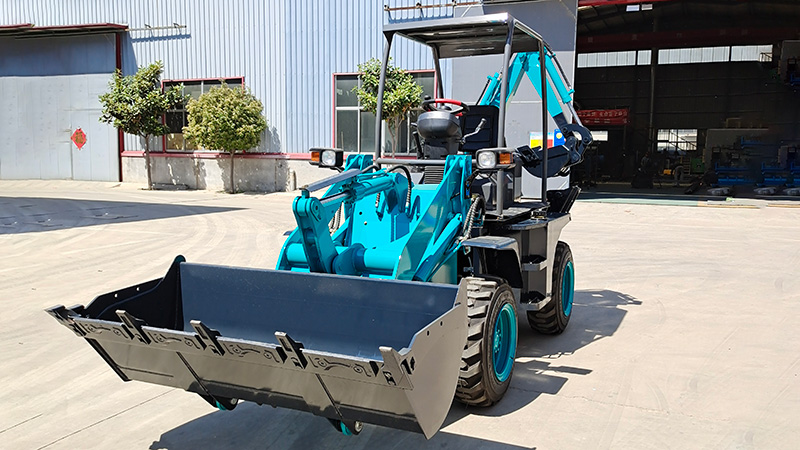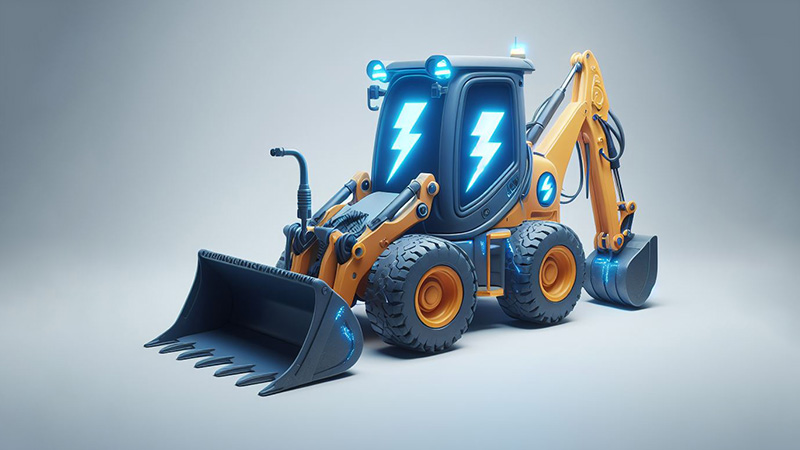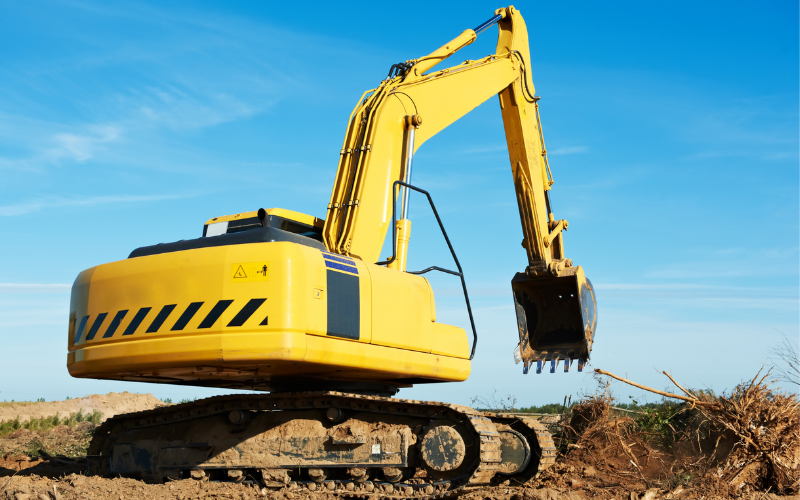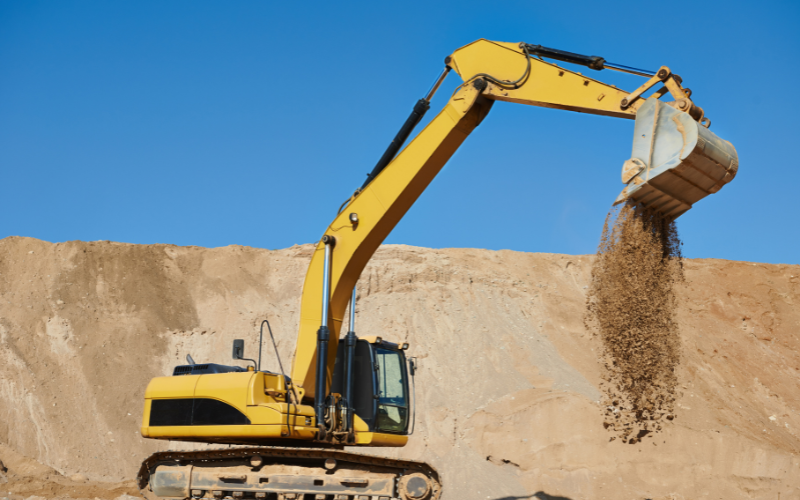
In today’s rapidly evolving construction industry, efficiency and sustainability have taken center stage.
Following the success of electric vehicles, electric backhoe loaders have emerged as a promising solution that provides a good balance of power and performance.
These versatile machines represent a significant step forward in the construction sector’s journey towards reducing carbon footprints and enhancing operational effectiveness.
In this article, we delve into the world of electric backhoe loaders, explore their benefits and applications, and contribute toward a sustainable future.
Overview of Electric Backhoe Loaders
Electric backhoes follow the trend of converting conventional gas and diesel-powered devices into electric equipment.
The success of electric vehicles has shown that eclectic motors have the raw power to accomplish such tasks and that there is a demand for greener alternatives.
Backhoe loaders require a lot of mechanical power for basic operation. Such power can only be attained through an equally powerful energy source.
Fossil fuel was the only viable source for driving heavy equipment for many years. Older Lead-Acid batteries could not replace fossil fuels.
However, the increasing mass adoption of laptops and smartphones has driven research into battery technology.
Advances in battery technology and the development of high-capacity Lithium-Ion batteries have enabled the electrification of powerful industrial equipment.
Lithium-ion batteries power the backhoe loader’s drivetrain and hydraulic motors, which previously relied on a combustion engine.
The battery simultaneously powers two hydraulic mechanisms; one controls the boom arm for the backhoe, and the other controls the front loader arm.
Electric vs. Diesel Backhoe Loaders
Electric construction equipment, such as backhoe loaders, has only recently entered the workforce. The first fully electric backhoe loader was launched in 2020.
In the grand scheme of things, the electric equipment market is still in its infancy.
However, the electric backhoes are already showing a promising start. They can match the power and performance of diesel-powered backhoe loaders while running on renewable electric power.
Here is a brief comparison of the key differences between electric and diesel machines.
| Attribute | Electric Backhoes | Diesel Backhoes |
|---|---|---|
| Weight | Very Heavy | Heavy |
| Torque | High | Medium |
| Recharge/Refuel Time | Very High | Low |
| Cost Per Mile | Great | Good |
| Environmental Impact | Minimum | Damagin |
| Run-time on Full Charge/Tank | Excellent | Average |
| Hydraulic Breakout Force | Excellent | Excellent |
Hydraulic breakout forces refer to the lift capacity of the backhoe loader at the tip of the front and back boom arms.
Electric motors can output hydraulic breakout forces equal to a diesel engine. However, the electric option accomplishes the task more efficiently.
Buyers should also pay close attention to the weight of electric construction equipment. Lithium-ion batteries are almost ten times heavier than a full tank of diesel. A standard 80-90kWh electric backhoe weighs around 1,300 pounds or over half a metric ton.
In electric backhoes, a single battery powers the drivetrain and hydraulic motors separately. Traditional backhoes use a small battery and IC engines for all operations.
Why are Electric Backhoe Loaders the New Trend?

The construction industry is already shifting to electric and hybrid equipment due to their many advantages over traditional diesel-powered machines.
Electric backhoe loaders, in particular, are gaining popularity due to several advantages they offer, especially regarding environmental benefits.
Here are some reasons why they are becoming the new trend.
1. Zero Emissions
One of the most significant advantages of electric backhoes is that they produce zero emissions while operating.
Traditional diesel-powered backhoe loaders emit harmful pollutants such as nitrogen oxides, particulate matter, and carbon dioxide.
Switching to electric power results in cleaner air and a healthier environment,
Going all-electric also prevents further damage to our delicate ecosystem, making electric backhoes an attractive option for environmentally conscious businesses and governments aiming to reduce carbon footprints.
Many countries mandate the use of diesel exhaust fluid (DEF) in construction equipment to reduce harmful exhaust gases.
However, if you deploy electric equipment at job sites, DEF regulations don’t apply to you.
2. Reduced Noise Pollution
Noise pollution is synonymous with construction equipment. The problem has gotten so bad that many countries, including the US, have had to release guidelines for noise reduction during nighttime construction.
Electric backhoe loaders run much quieter than their diesel counterparts.
This reduction in noise pollution is especially beneficial for nighttime operations and construction sites in urban or population-dense residential areas.
Operating electric construction equipment is also much safer for workers, as the absence of engine noise helps them better communicate and avoid accidents.

3. Energy Efficiency
Electric backhoe loaders are more energy-efficient compared to diesel-powered ones.
According to the US Department of Energy, an all-electric vehicle is nearly three times more efficient than a gasoline-powered one.
DC electric motors have a higher energy-to-propulsion conversion rate than internal combustion engines, resulting in less energy wasted as heat during operation.
When the backhoe loader isn’t actively running during idle hours, a diesel engine continuously consumes fuel. In comparison, electric backhoe loaders enter a low-power state and conserve energy.
4. Lower Operating Costs
While the initial investment in electric backhoe loaders may be higher than diesel-powered ones, they typically have lower operating costs over their lifespan.
Diesel-powered machines quickly burn through the fuel and require daily tank refills. On the other hand, electric construction equipment can be powered by solar energy, bringing the energy costs down to near zero.
Additionally, electricity is often cheaper than diesel fuel, resulting in lower fuel costs over time. The average electricity cost in the US is 16 cents per kWh.
Thus, a fully electric backhoe loader with its 90kW lithium-ion battery would only cost $14.4 for a full charge.
Diesel currently costs $3.64 per gallon. A top-up for an average diesel-powered machine with this 35-gallon fuel tank will cost $127.4.
All energy costs were recorded at the time of this article’s publishing; prices will vary over time.
5. Lower Maintenance Costs
A lesser-known benefit of electric equipment is its considerably lower maintenance costs. Diesel-powered construction equipment, such as a backhoe loader, requires regular engine oil replacement, fuel line wear assessment, and engine knocking can occur.
Electric equipment replaces the older internal combustion engine with a DC motor and the fuel tank with a lithium-ion battery.
This closed system has fewer moving parts and negligible corrosive liquids. Additionally, a single battery powers the engine (DC motor) and hydraulic motors separately, further reducing points of failure.
Short-term maintenance costs might not seem like a big deal, but the savings can increase over time.
Some EV manufacturers recommend an annual vehicle service and maintenance check, compared to the weekly or monthly service for gas-powered machines.
6. Government Incentives
Governments worldwide are increasingly offering incentives and subsidies to promote the adoption of electric vehicles, including backhoe loaders.
The US offers significant tax credits for vehicles using alternative fuels such as natural gas, liquid hydrogen, and electricity.
Incentives such as tax credits, grants, or rebates make electric options more financially appealing for businesses and contractors. These incentives can help reduce the initial investment cost of electric backhoes.
These government initiatives have played a huge role in the rapid growth of the electric equipment market.
7. Meeting Environmental Regulations
With the global temperature increase, governments worldwide have turned to more stringent environmental regulations.
Industries are now more than ever under pressure to reduce their carbon emissions and environmental impact.
Construction equipment that has a notoriously large carbon footprint now has excellent electric vehicle options, such as electric backhoe loaders, that meet these regulations and demonstrate a business’ commitment to sustainability.
Applications of Electric Backhoe Loaders
Electric backhoe loaders find applications across various industries due to their versatility, environmental friendliness, and efficiency. An electric backhoe can do everything a diesel one can while running on renewable energy.
Here are some examples of their applications in construction projects, urban development, and other industries:
1. Construction Projects
Electric backhoes cover several work areas at a construction site. Construction companies use backhoes for small and large-scale projects.
The small and more agile design of backhoe loaders enables them to operate in the narrow streets of residential areas.
- Excavation and Digging
- Material Handling
- Road Construction
- Demolition Clearance
2. Urban Development
In urban areas, electric backhoe loaders are used to install and remove road signs, bollards, etc. Occasionally, you will see a backhoe used for landscaping work.
The silent operation of electric backhoe is a key reason for its use in urban areas,
- Road & Infrastructure Maintenance
- Underground Water & Sewage Lines
- Landscaping & Green Infrastructure
3. Agriculture
On the agriculture side, electric backhoe loaders offer various benefits. Farmland is vast, and the nearest gas station is often several miles away.
Additionally, farmers have enough space to install a few solar panels or even a windmill for better self-sufficiency.
- Land Preparation
- Crop Planting
- Fence Construction
- Irrigation Ditches
4. Mining and Quarrying
Electric backhoes play a supporting role in the mining industry. Mining and quarrying require large, multi-story tall excavators for digging and giant dump trucks for material removal.
Backhoes help prepare the area for later excavation and extraction.
- Site Preparation
- Clearing Land
- Material Handling
- Building Access Roads
5. Waste Management
Waste management sites can utilize electric backhoe loaders for various applications. These machines excel at moving and managing heavy waste material from a safe distance.
- Spreading & Compacting Waste
- Digging Holes & Ditches
- Managing Composting Areas
The Challenge of Electric Backhoe Loaders
While electric backhoe loaders offer numerous advantages over diesel engines, their adoption also presents several challenges.

1. Higher Initial Investment
Electric backhoe loaders generally cost more than their diesel counterparts. The higher cost comes down to using expensive components such as electric drivetrain components, batteries, and smart monitoring systems.
This can be a barrier for businesses, especially smaller contractors or construction companies with limited capital, despite potential long-term savings.
Additionally, businesses already invested in diesel and gasoline construction equipment cannot justify the extra cost of shifting to alternative fuels.
2. Charging Requirements & Infrastructure
A diesel-powered machine can be refueled in a few minutes—half an hour if you account for the drive to and from the gas station. However, an electric backhoe charger connected to a 220v power supply will fully charge overnight.
Being unable to use a vehicle for eight or more hours during its charging period is unviable for most businesses.
Higher voltage EV chargers can go up to 900v, decreasing the charge times but at a cost. Pulling that much electricity at any given moment will put unnecessary strain on the local electric grid.
Current electricity infrastructure doesn’t have the high load capacity required for electric construction equipment. A business with two or more electric backhoes will struggle to charge them simultaneously on commercial electricity grids.
Additionally, the availability of charging stations may be limited in certain areas, posing challenges for operations that require frequent or continuous equipment use. Installing an electric vehicle (EV) charger at a job site isn’t ideal.
3. Long-Term Benefits vs. Short-Term Costs
While electric backhoe loaders offer long-term benefits such as lower operating costs, reduced emissions, and potential regulatory incentives, some businesses may focus primarily on short-term financial considerations.
It could take years for a business to see a real return on investment (ROI) after shifting to electric construction equipment. The first fully electric backhoe loader claims an ROI of five years.
The higher upfront cost and lack of education about electric vehicles may deter potential buyers who prioritize immediate cost savings over future benefits.
Businesses will often choose to prioritize old, reliable technology that has been effective for decades rather than take the initiative toward greener electric backhoes.
The Future of Electric Backhoe Loaders
Electric construction equipment has a bright future. In just a few short years, we have seen electric forklifts, trucks, and backhoes take to the market with positive consumer feedback.
Backhoe loaders were already a versatile and useful tool, but their utility has greatly expanded with the incorporation of DC motors into the design.
Right now, the biggest hurdle for electric backhoes is electricity infrastructure. As more and more EV charging stations pop up and the charging technology improves, the value proposition of electric construction equipment will soar.

Conclusion
Electric backhoe loaders are an improved version of traditional diesel-powered backhoes. They offer similar, if not better, functionality while lowering emissions and reducing an operation’s carbon footprint.
Current electric backhoes have a higher sticker price and a relatively long ROI period. The benefits of switching to an all-electric backhoe are greater for larger construction companies. Smaller businesses will still see better returns on diesel backhoes.
Get the Ultimate Backhoe Loader from Everstar!
Experience unmatched efficiency and reliability with Everstar’s cutting-edge backhoe loaders. Built with precision engineering and backed by over a decade of industry expertise.
Our backhoe loaders meet rigorous international safety and quality standards, including ISO9001 and CCC compliance.
Customer satisfaction is at the forefront of our business. We offer FREE training and installation services alongside a robust parts guarantee.
Elevate your business to new heights with Everstar. Contact us Now!